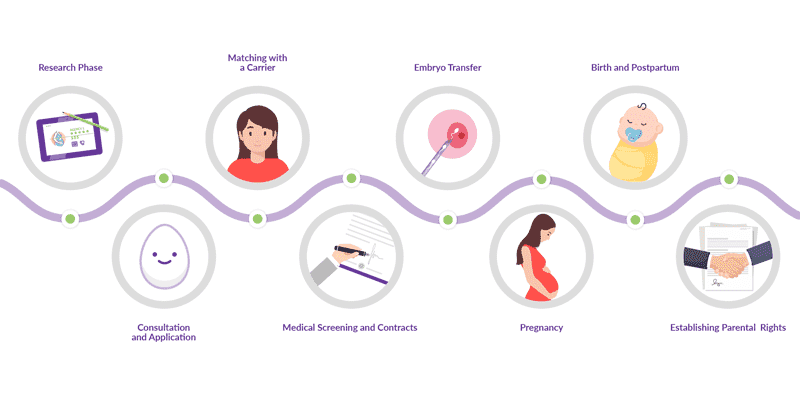1. Exploring Gestational Surrogacy
Gestational surrogacy is a modern marvel of reproductive technology that has revolutionized the way individuals and couples can build their families. In gestational surrogacy, commonly known as the gestational carrier process, the surrogate undertakes the role of carrying a baby who is not biologically connected to her. Instead, the embryo is created using the intricate process of in vitro fertilization (IVF), incorporating the genetic material from the intended parents.
The journey of gestational surrogacy commences with the careful selection of a surrogate who willingly commits to carrying the embryo of the intended parents to full term. Once a suitable match is identified, the process proceeds as the intended mother or an egg donor undergoes ovarian stimulation to produce multiple eggs.
Subsequently, these eggs are retrieved and subjected to fertilization with sperm from the intended father or a chosen sperm donor within the controlled environment of a laboratory. Following fertilization, the resulting embryos undergo careful monitoring and cultivation for several days to assess their viability.
Once the embryos attain an optimal stage of development, a thorough selection process identifies which embryos are best suited for transfer to the surrogate’s uterus.
This critical step marks the culmination of the IVF process, as one or more embryos are delicately placed within the surrogate’s womb, where they will hopefully implant and initiate the miraculous journey of pregnancy.
This transfer typically occurs through a minimally invasive procedure known as embryo transfer, during which the embryos are carefully placed into the surrogate’s uterus using a thin catheter. Following the embryo transfer, the surrogate undergoes close monitoring and medical care to support the pregnancy.
Regular check-ups, ultrasounds, and blood tests constitute essential components of the monitoring process throughout the pregnancy journey, serving to track progress and safeguard the health and well-being of both the surrogate and the developing fetus.
A notable advantage of gestational surrogacy lies in its capacity to enable individuals or couples to conceive a child who shares a genetic connection with them. This can be particularly important for individuals who are unable to conceive or carry a pregnancy due to infertility, genetic conditions, or other health concerns.
Gestational surrogacy offers a path to parenthood that bypasses many of the genetic obstacles that may prevent traditional conception or pregnancy. Moreover, gestational surrogacy offers a degree of separation between the surrogate and the child she bears, potentially alleviating certain emotional and legal intricacies commonly linked with traditional surrogacy arrangements.
Because the surrogate is not genetically related to the baby she carries, there may be fewer concerns about parental rights and custody issues, leading to a more straightforward and harmonious surrogacy journey for all involved. Despite its many advantages, gestational surrogacy is not without its challenges. The procedure can be intricate and costly, encompassing various medical procedures, legal contracts, and logistical factors. Additionally, finding a suitable surrogate and navigating the legal and ethical implications of surrogacy can be daunting for intended parents. However, for many individuals and couples, the opportunity to have a child through gestational surrogacy outweighs these challenges.
The chance to experience the joys of parenthood and build a family of their own is priceless, and gestational surrogacy offers a pathway to achieving these dreams for those who may not be able to do so through traditional means. Each type of surrogacy offers its own set of advantages and challenges, and the decision to pursue surrogacy should be carefully considered based on individual circumstances and preferences.
Whether through gestational surrogacy, which allows for a genetic connection between the intended parents and the child, or traditional surrogacy, which fosters a unique bond between the surrogate and the child, surrogacy offers hope and possibilities to those longing to become parents.
With the support of medical professionals, legal experts, and surrogacy agencies, individuals and couples can navigate the surrogacy journey with confidence and optimism, knowing that they are on the path to fulfilling their dreams of building a family.

